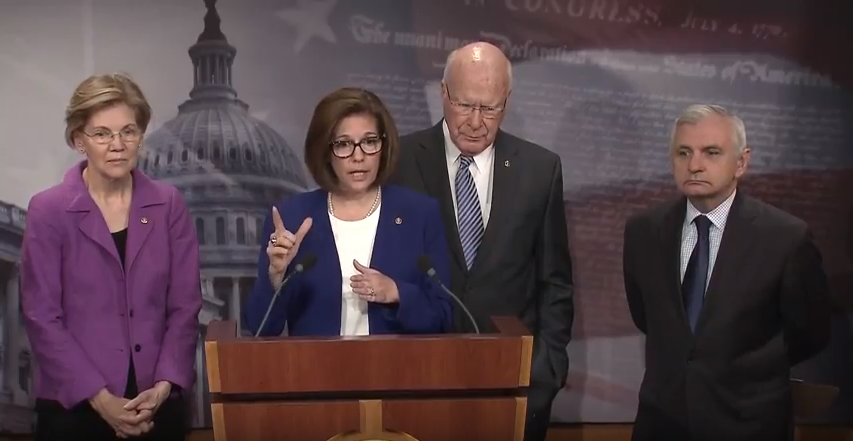Washington, D.C. – U.S. Senator Catherine Cortez Masto (D-Nev.) joined Senate Democratic Leader Chuck Schumer (D-N.Y.) and U.S. Senators Patrick Leahy (D-Vt.), Jack Reed (D-R.I.), Al Franken (D-Minn.), and Elizabeth Warren (D-Mass.) to speak out against Senate Republican efforts to overturn the Consumer Financial Protect Bureau’s (CFPB) consumer protection rule on forced arbitration. The Senators discussed how forced arbitration clauses waive a customer’s right to sue a company in case of a dispute and are often found in the fine-print of contracts and app downloads.
In her remarks, Senator Cortez Masto highlighted the critical work she did as Attorney General in Nevada protecting consumers, homeowners, service members, and taxpayers from predatory financial practices. The Senator underscored the crucial role of the CFPB over the past six years in supporting the efforts of state attorneys general in the fight and the $12 billion the agency has returned to 29 million consumers for the unscrupulous behavior of major companies like Wells Fargo and Equifax. The Senator explained how the agency has resolved the cases of 14,600 Nevadans and provided additional support to her efforts to hold Wells Fargo accountable for the 54,000 phony accounts Wells Fargo opened in Nevada and the 143 million Americans impacted by Equifax’s breach of sensitive personal data. At the conclusion of the press conference, Senator Cortez Masto joined in a question and answer session with Senator Warren on how the arbitration process benefits major companies and fails consumers.
“Let me add one thing. I think Senator Warren has really clarified how the process works, but these arbitrators are quite often paid by the corporations because it is the losing party that pays. If you are an arbitrator that relies on the parties—particularly the losing party to pay and you want to continue to be an arbitrator—what do you think you are going to do?” said Senator Cortez Masto. “When these companies come in and they get to pick the arbitrator with the list that they have, they are crossing off the ones they do not want and they are saying, ‘I want this arbitrator.’ So, that is how the process works and that is why it is not a fair process for the individual consumer who is going in to fight with these corporations because the dollars are paid usually by the losing party, which is the company.”
###
